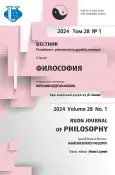От мира восприятия - к феноменологии способностей
- Авторы: Соложенкин Б.С.1
-
Учреждения:
- Первый МГМУ им. И.М. Сеченова Минздрава России (Сеченовский Университет)
- Выпуск: Том 28, № 1 (2024): ФИЛОСОФИЯ БУДДИЗМА МАХАЯНЫ
- Страницы: 199-218
- Раздел: ИСТОРИЯ ФИЛОСОФИИ
- URL: https://journal-vniispk.ru/2313-2302/article/view/325456
- DOI: https://doi.org/10.22363/2313-2302-2024-28-1-199-218
- EDN: https://elibrary.ru/BHLXSU
- ID: 325456
Цитировать
Полный текст
Аннотация
«Феноменология восприятия» Мерло-Понти содержит посылку о восприятии как о первичном уровне данности мира. Восприятие предстает как всегда незавершенный синтез множественного, сводящий вместе телесные и вещественные аспекты. Такая наиболее простая трактовка восприятия как некого общего установления контакта внутри диады «тело-мир» есть предварительная аксиома для объяснения дальнейшего процесса смыслообразования. При этом теоретические искания Мерло-Понти явно предполагают большее, и восприятие мыслится им также и окончательной точкой поисков смысла этого контакта. Тем самым в Феноменологии различима и вторая трактовка восприятия как наделяющего смыслом, работающего в связке с дорефлексивным когито. Мерло-Понти предполагает, что эти трактовки совместимы друг с другом, однако переход между ними представляется действительно проблемным. В данной работе автор показывает, что предел изначального синтеза восприятия - некоторый смысл воспринятого («эта лошадь», «зеленая густота, которая неслась навстречу») - недостижим изнутри самого восприятия и только его силами. Оно само опосредовано другими способностями, такими как память, рефлексия, и воображение. Необходимость этого аргументируется несколькими способами; отношения в паре восприятие-воображение представляют наиболее характерный случай, где Мерло-Понти, если судить по более поздним работам, сам подходит близко к признанию ограниченности гипотезы «мира восприятия», к необходимости феноменологической разработки темы способностей. Исходя из применения феноменологического метода и анализа концептуальных построений Мерло-Понти, можно заключить следующее: «Мир восприятия» - не существует, но возможна (и необходима!) феноменология способностей.
Ключевые слова
Об авторах
Борис Сергеевич Соложенкин
Первый МГМУ им. И.М. Сеченова Минздрава России (Сеченовский Университет)
Автор, ответственный за переписку.
Email: gerzhogzdes@mail.ru
ORCID iD: 0000-0003-1125-1342
кандидат философских наук, доцент, кафедра гуманитарных наук
Российская Федерация, 119991, Москва, ул. Трубецкая, д. 8, стр. 2Список литературы
- Merleau-Ponty M. Phenomenology of Perception. Moscow: Yuventa, Nauka publ.; 1999. (In Russian).
- Shestova EA. The Language and Method of Phenomenology: O. Fink and the Reception of his Ideas (M. Merleau-Ponty, J. Derrida): dissertation for the Candidate of Philosophical Sciences. Moscoe; 2017. (In Russian).
- Yampol'skaya AA. Phenomenology in Germany and France: Problems of the Method. Moscow: Rossiiskii gosudarstvennyi gumanitarnyi universitet publ.; 2013. (In Russian).
- Marshall G. A guide to Merleau-Ponty`s Phenomenology of perception. Milwaukee: Marquette University Press; 2008.
- Allen K. Merleau-Ponty and Naïve Realism. Philosophers’ Imprint. 2019;(19).
- Merleau-Ponty M. The Visible and the Invisible. Minsk: Logvinov publ.; 2006. (In Russian).
- Heidegger M. Hegel’s Phenomenology of Spirit. Bloomington: Indiana University Press; 1988.
- Henry M. Material Phenomenology. Moscow: Tsentr gumanitarnykh initsiativ publ.; 2016. (In Russian).
- Vdovina IS. M. Merleau-Ponty: from Primary Perception to the World of Culture. In: M. Merleau-Ponty. Phenomenology of Perception. Moscow: Yuventa, Nauka publ.; 1999. P. 582—596. (In Russian).
- Čapek J. Perceptual Faith beyond Practical Involvement: Merleau-Ponty and His Pragmatist Readers. In: Pragmatic Perspectives in Phenomenology. New-York and London: Routledge; 2017.
- Shpet G. Phenomenon and Sense: Phenomenology as a Basic Science and its Problems. Tomsk: Vodolei publ.; 1996. (In Russian).
- Ihde D. Expanding Hermeneutics: Visualism in Science. Evanston: Northwestern University Press; 1998.
- Merleau-Ponty M. Eye and Mind. Moscow: Iskusstvo publ.; 1992. (In Russian).
- Merleau-Ponty M. Signs. Moscow: Iskusstvo publ.; 2001. (In Russian).
- Merleau-Ponty M. The World of Perception. New York: Routledge; 2004.
- Pertseva A. Image of the Other in Merleau-Ponty's early theory of imagination. Filosofskii zhurnal. 2017;10(1):116—135. (In Russian). https://doi.org/10.21146/2072-0726-2017-10-1-116-135
- Morley J. The texture of the real: Merleau-Ponty on imagination and psychopathology. In: Imagination and its pathologies. Cambridge: MIT Press; 2003.
Дополнительные файлы









